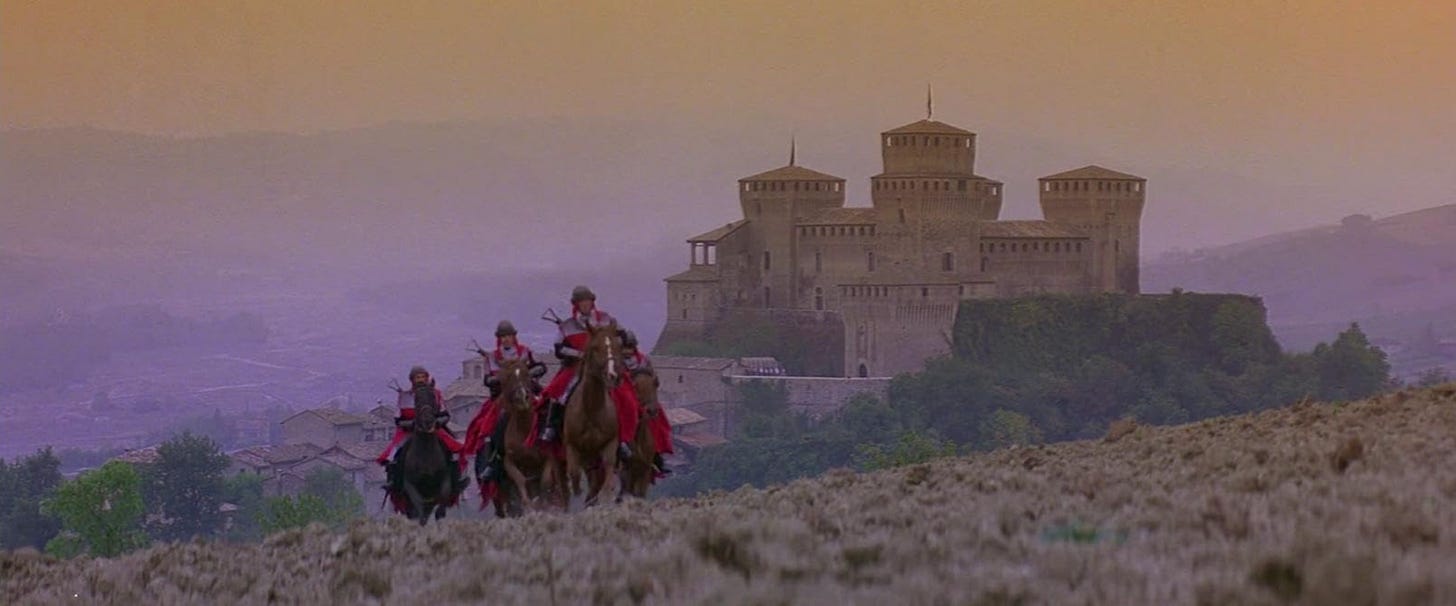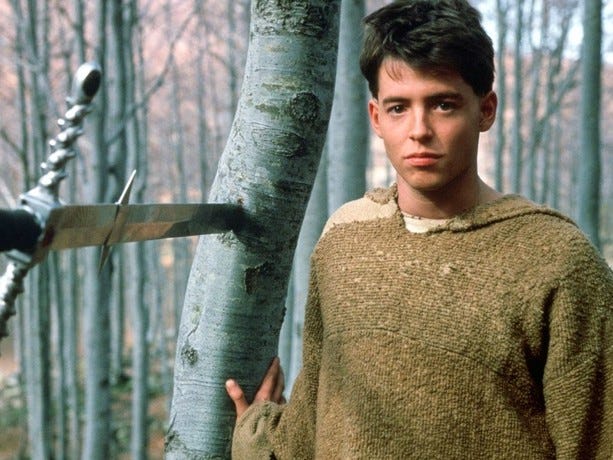The Enthusiast is a reader-supported publication. If you enjoy what you’re reading here, why not subscribe? You’ll enjoy free articles, join a community of defiant praise, and get access to recommendations, playlists, and invigorating chats.
Ladyhawke is one of my family's sacred texts, alongside Rich Mullins, Tolkien, and Bill & Ted’s Excellent Adventure. You might be tempted to ask, “Ladyhawke? Wait, isn’t that the one with the cheesy soundtrack?”
Let me stop you right there. Turn off whatever Instagrammer-turned-pop-star you’ve been playing on Spotify, go back, and listen. Then tell me it’s not the most badass movie-theme synth-jam since the glory days of Vangelis.
In fact, everything about 1985’s Ladyhawke is magnificent. It’s the kind of movie you can build your life around. I’m not insecure about this in the least. In the words of all those Craigslist kings, “I know what I’ve got.” I’m not afraid of over-hyping it. If you don’t like Ladyhawke, I am 100% confident that the problem is you.
Let’s take a step back. It’s a Saturday morning in 1996, and I’m putting in the VHS, with all the satisfying clicks and whirrs of the Radio Shack Age. The basement is dark, except for light coming from the little but chunky TV we’ve taken from Navy base to Navy base before settling down in Lancaster County, PA. I make sure the space is clear, because I’m not really watching the movie – I’ve already seen it countless times – I’m just planning to rock out to the soundtrack. The opening credits roll. Golden clouds alternate with the moon in a black sky, as the Alan Parsons Project and Philharmonia Orchestra crescendo into the kickingest synth riff I’d ever heard. And we aren’t even to the screaming guitar solo yet.
Brief aside: for the longest time, it was very hard to find a reasonably-priced copy of the Ladyhawke soundtrack on CD. I think I even had a hard time finding it on Napster. So that deteriorating VHS cassette was really the only thing for a long while, at least until my girlfriend tracked it down on eBay for me in 2012. She is now my wife. Coincidence? I think not.
One reason the soundtrack is so notable is that it was, apparently, widely derided by audiences in 1985. But you know what? I’ve been going back to listen through the Billboard top 100 hits from that decade, and it is astonishing to me how many “adult contemporary” songs made it to number 1. So you know, I think we can say the judgment of that period was suspect.
The other reason is that the music might feel like a contrast with what is otherwise a very earthy, non-digital medieval fairytale. You can decide for yourself whether the disparate elements come together as a unified whole (though there is, of course, only one right answer here). But the synth makes a little more sense when the star is Rutger Hauer. I was watching it as a kid, not yet familiar with Blade Runner, so Rutger Hauer will always, first and foremost, be Captain Etienne Navarre instead of a Replicant with a tortured soul. It makes sense though; his eyes have a stricken intensity that makes him great on camera. So if you’re having a hard time pulling the pieces together, just say to yourself, “80s. Rutger Hauer. Synth is back in a big way anyway. I can do this.”
And there is much to celebrate beyond the music. The 80s were a golden age for medieval fantasy. You’ve got Neverending Story, Willow, Labyrinth, Dark Crystal, Highlander, Excalibur, and, of course, The Princess Bride. Ladyhawke hangs with the best of them, but it hits harder. The scope is narrowed; there’s no immortal evil to be fought, no world that needs saving. In some ways it even feels like a western – the lone rider on a black horse just wants revenge on the corrupt ruler who holds the town in his fist. It makes sense then, that instead of a soundstage with a fog machine, the filming locations are real, wide open spaces in places like mountain meadows Abruzzo, Italy, or Parma, with crumbling medieval fortresses in the background. If the soundtrack weren’t already awesome, a score by Ennio Morricone wouldn’t be out of place.
It’s still a fairy tale, though. Or, rather, it is a fairy story, in the Tolkien sense, even more appropriately so in contrast to those other fantasy films. A quick refresher, from his essay, “On Fairy Stories:” “Faerie contains many things besides elves and fays, and besides dwarfs, witches, trolls, giants, or dragons: it holds the seas, the sun, the moon, the sky; and the earth, and all things that are in it: tree and bird, water and stone, wine and bread, and ourselves, mortal men, when we are enchanted.”
And much of it is already backstory when the film starts: the Captain of the Guard of the town of Aquila fell in love with a beautiful woman, Isabeau. But the bishop of Aquila, an evil man, desired Isabeau for himself, and made a pact with the Devil to curse the couple. By day, he is a knight, and she takes the form of his hawk; by night, he is a black wolf, and she a woman, his keeper. “Always together, forever apart.”
In classic fairy tale form, we learn this story by way of a more grounded character - the thief Phillipe Gaston, called “The Mouse”. Gaston is the archetypal genre-savvy, skeptical, world-weary proxy for us viewers. (Interestingly, Ladyhawke’s story itself was completely made up by the writer, Edward Khmara, and not based on any actual medieval fairy tales. Philippe Gaston, however, was inspired by a real historical character: the 15th-century thief and poet Francois Villon.) Philippe talks to God, but ironically, Matthew Broderick’s perpetual smirk a perfect fit. “I know I told you, Lord, I would never steal again,” he remarks. “But I also know, that you know,” he continues, “what a weak-willed man I am.”
The Mouse knows that he lives in a hard, cruel world, with predatory bishops and corrupt soldiers. God, fairy tales, a just liege lord, and things worth risking your neck for - all are equally implausible to Philippe. But just as he can’t stop himself from talking to God, he also can’t help but be pulled into the gravity well of curses, magic, and the thin margin of hope for redemption. The monk Imperius tells him: “You have stumbled onto a tragic story, Philippe. And now, whether you like it or not, you are lost in it, like the rest of us.”
For a ten-year-old boy, there was indeed a lot to get lost in here. Swords and crossbows. Castles and snow-capped mountains. A fantastic climactic battle where a black knight charges, mounted, into a medieval cathedral. (Sidenote: director Richard Donner wanted to do this scene so badly that they made a Romanesque church from scratch, because no actual cathedrals would let him bring a giant stallion into their sanctuary. The scene is appropriately awesome, in the classical and modern sense of the word.) Justice. The love of a woman. Friendship tested and found true.
In his intro to his version of the Arthuriad, John Steinbeck writes about returning to his “secret book” as a boy, and how that returning formed him: “If I could not choose my way at the crossroads of love and loyalty, neither could Lancelot. I could understand the darkness of Mordred because he was in me too; and there was some Galahad in me, but perhaps not enough. The Grail feeling was there, however, deep-planted, and perhaps always will be.”
Like Steinbeck with Arthur’s knights, I have been haunted by that line from Imperius these past thirty years. What Story am I lost in? Is there a part for me to play, even if I’m a broken vessel like Philippe or Imperius? Is it, truly, a tragedy? Or is there reason to hope against hope? To me, Ladyhawke will always be much more than just another 80s fantasy. It’s a fairy story, complete with eucatastrophe beyond what the heroes could have hoped for. And the soundtrack’s great, no matter what you have to say about it.
If you love the Enthusiast, buy us a coffee:
Enthusiastic about what you’re reading here? Leave us a comment and start a good conversation. Further recommendations, random thoughts, and positive diatribes are all welcome.









wow. I feel like this is the manifesto I've always needed. Thank you
Yes to Ladyhawke.